Meet the UK’s real-life mermaids
All over the UK, a growing number of women – and some men – are adopting a ‘mersona’, donning half-fish costumes to splash about in the waves. Harriet Marsden went to see what it was all about


Mermaids, sirens of the sea with breasts and fishtails, are creatures of folklore and myth, and may not be a typical sight on a bank holiday. But earlier this month, while landlubbers celebrated the platinum jubilee, a shoal of mermaids washed up on England’s southern shores.
On 2 June, hundreds of people gathered in Plymouth’s Tinside Lido to take part in an attempt to break the world record of the largest gathering of people dressed as merfolk. Mostly women, but also men and children, wore novelty fish tails and shell bikinis to hold a pose for five minutes, while stewards dressed as pirates kept a weather eye. Organiser, Pauline Barker (known as Pauline Mermaid), counted 377 attendees; the previous record was 300. She’s now awaiting official recognition from the Guinness Book of Records.
This unlikely maritime meet-up was more than just scaly steampunk. All over the UK, a growing number of mostly women are adopting a “mersona” donning half-fish costumes to splash about in the waves. And for some, dressing as a mermaid has been a lifeline. One of the 377 attendees was the famous Plymouth Mayflower Mermaid. But when I first met her, in her “civilian clothes”, volunteering at the Whitleigh Big Local community hub, she introduced herself as Becky Allen.
Rebecca Allen, now 32, was raised in the small town of Kingsbridge, in what she describes as a “dysfunctional” home where she was told she’d amount to nothing. Social workers might describe it as abusive – although, at the time, Becky says, “I told school and social services and the police, and nobody would pay any attention or support me. I was badly failed by the system.”
As a child, Becky was fascinated by The Little Mermaid, and by the ocean in general. She taught herself to swim, by “a lot of trial and error”, and nearly drowned in the process. Perhaps, she admits, she sought refuge in her imagination to escape the reality of her childhood.
Becky’s mother was also herself a victim of domestic abuse: a worsening cycle of violent partners and toxic behaviours. Things only grew worse when the family moved to Plymouth when Becky was nine. Bullied and belittled by her mother and taunted by her peers at school, Becky reached a point when she’d had enough, and walked out the door. She was just 12. For a few years, she alternated between friends’ sofas and the cold, night streets – until she finally secured a flat in Whitleigh, a fairy-like forested enclave overlooking North Plymouth. “When I moved here, my first thought was: this is absolutely beautiful.” It was also near enough to the sea to be perfect for a mythical mermaid.
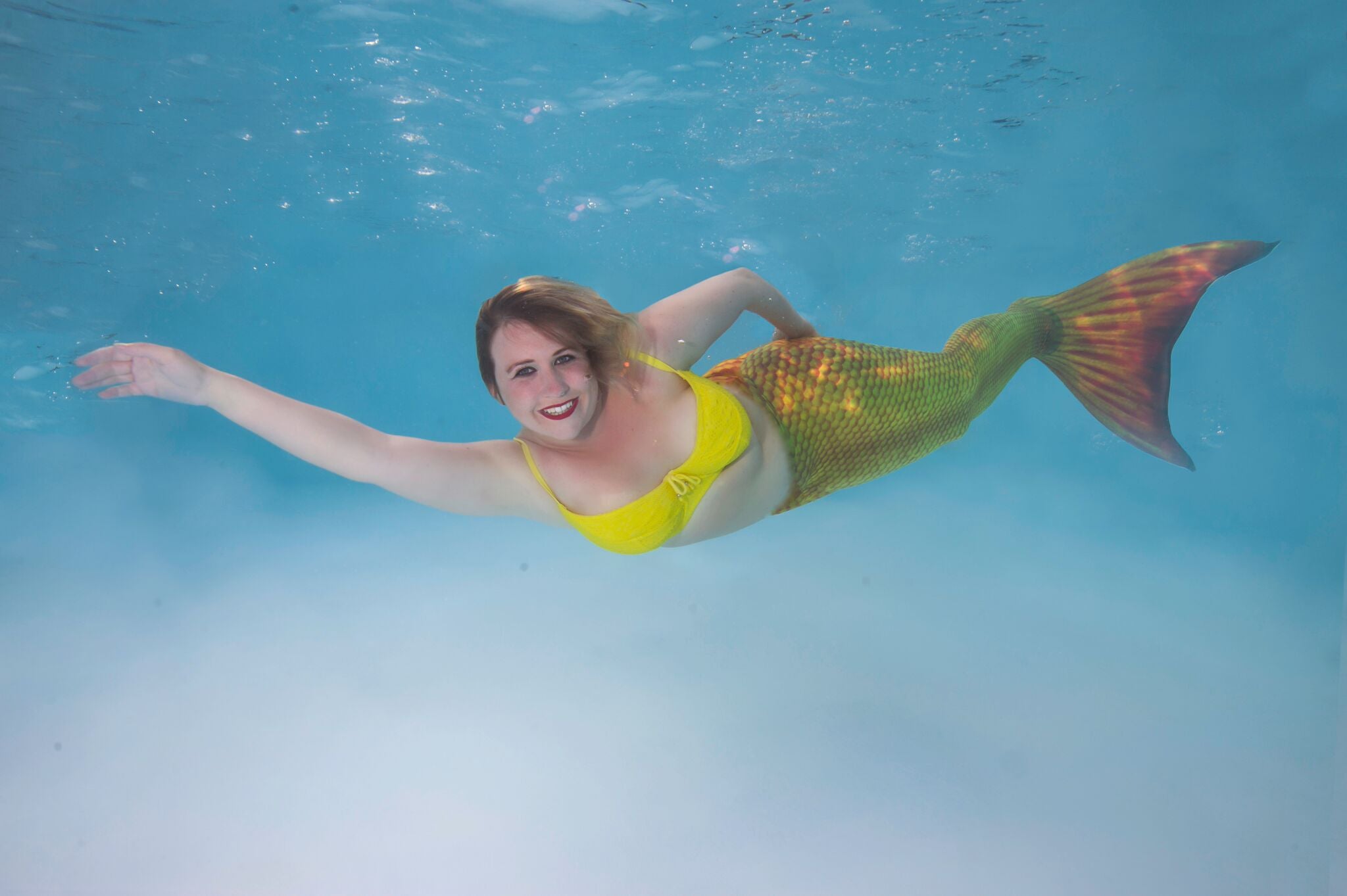
Due to her disability, Becky was increasingly struggling with mobility issues. She was prescribed hydrotherapy and began swimming regularly, feeling her limbs ease and uncurl in the water. “It’s a form of therapy for me,” she says, both physical and emotional. She kept herself to herself at first, but as her mobility grew, so too did her confidence as a performer. She felt herself becoming stronger in the quiet greenery.
Out of the blue, Becky came across a girl working as a professional mermaid. Her new friend told her about the existence of Merfolk UK – a national shoal of professional and amateur mermaids and mermen. Even now, Becky’s face brightens when she remembers how it felt to discover that there was this whole underground – or underwater – merfolk culture in the UK. “I thought, ‘oh my god, these are my people. My people are here.’”
Intriguingly, the idea of mermaids – or creatures that are part women, part fish – has popped up in folklore from all over the world. From the ancient Greek mythologies of vain “sirens” holding a comb and a mirror, to Slavic stories of beautiful “rusalka” luring sailors to their doom, to fish-tailed women in Mesopotamian artwork, to Hans Christian Anderson’s dark tail A Little Mermaid, they are a global phenomenon, dating back to life’s beginnings in the murky primordial oceans. Many theories abound as to the origins, from drunken sex-starved sailors on all-male crews to confused sightings of manatees, to the so-called “Aquatic Ape Theory” positing that human beings also developed in the ocean. They were often depicted as beautiful but deceptive harpies, harbingers of doom and shipwreck, but in more recent years have benefitted from the Disney treatment.
There are so many different types, so someone who’s not very confident in themselves can take on the persona of a mermaid and feel more confident, almost like an energy boost
But for Jessica Pennington, the founder of Merfolk UK, the appeal of dressing as a mermaid is that “there are no hard and fast rules because they’re a mythological creature. It’s accessible, it’s magical, it’s whatever you want it to be.”
Some “merfolk” use the Disney version as their inspiration, with pretty flowers and shells. One larger lady, says Jessica, dresses up as an orca-type mermaid, because she swims in Scotland “where it’s extremely cold”.
Jessica is a 31-year-old finance professional from Essex, perhaps not your typical mermaid. “I’ve always loved mermaids,” she says. “I’ve been obsessed with them for as long as I can remember, and all things sea-related but particularly mermaids.”
When she was 25, she stumbled upon a freediving company that offered an additional course: mermaiding. The course taught swimmers to perform in tails, pose for photos and “look cool”.
“That really appealed to me,” says Jessica. “So I jumped right on it. And it was through that that I discovered so many other people have the same love and passion for mermaids I did. When I finished the course, I got my first tail.”
But pursuing her new passion was rocky. There are so many safety precautions around swimming in constricting mermaid tails, she explains. “You can’t just take them to your local pool. I was very excited to use my new tail but I had nowhere to go.”
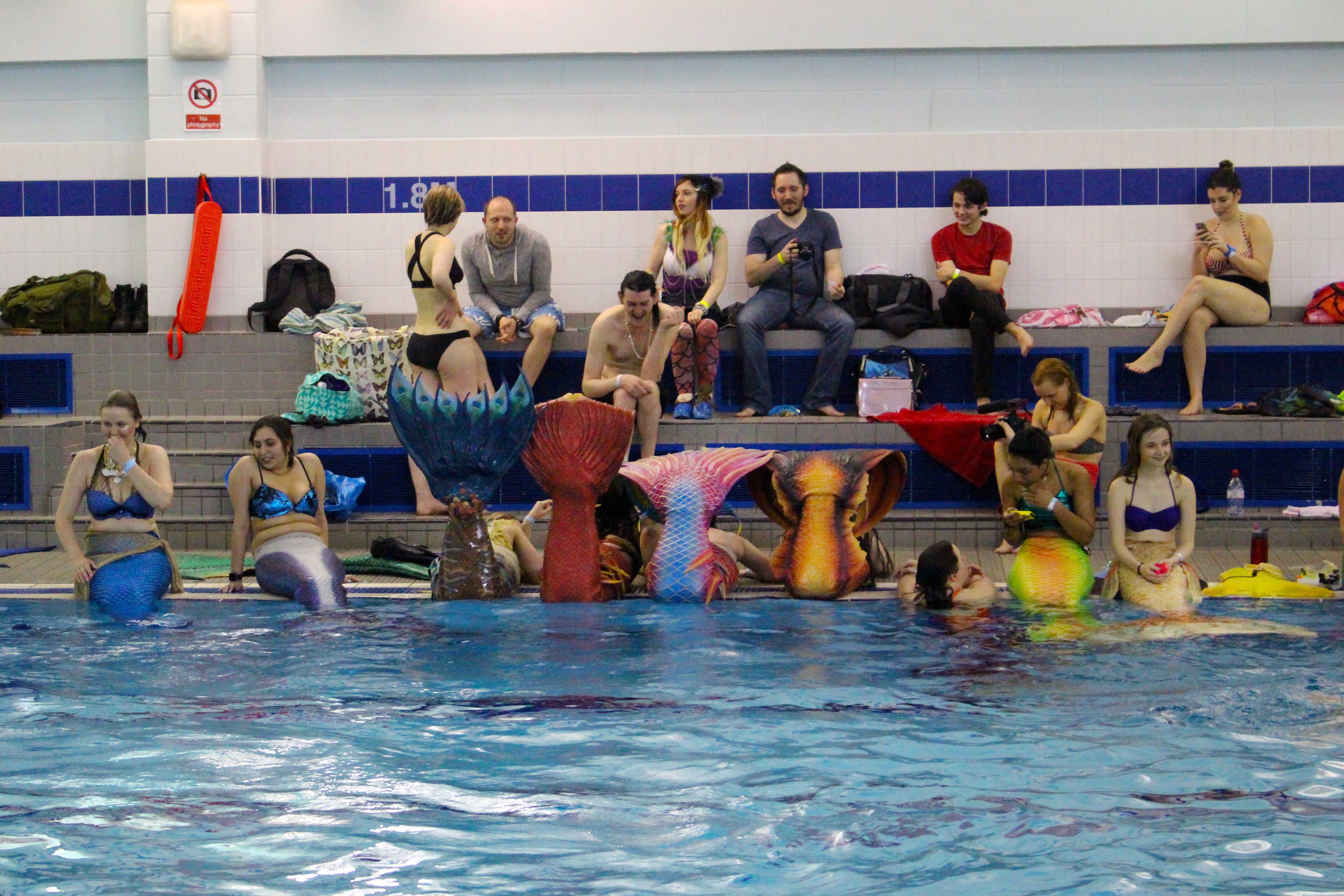
Jessica turned to social media for advice, and stumbled upon a secret community of merfolk enthusiasts. “That’s what gave me the idea to start Merfolk UK, to get everybody together.” In 2017, Merfolk UK hosted its annual convention that has become the highlight of the maritime calendar.
Jessica is a career-driven person, often extremely busy, so, for her, performing as a mermaid is “an escape from the harsh realities we live with. It gives me back a little bit of that childlike magic that you tend to lose as we grow up.
“A lot of people think mermaids aren’t necessarily the most lovely of creatures. They’re beautiful, but they’re tricksy. There are so many different types, so someone who’s not very confident in themselves can take on the persona of a mermaid and feel more confident, almost like an energy boost.”
But for many others, performing as a mermaid is a profession as well as an escape. Women all over the UK are paid to swim in aquariums or appear at corporate events or children’s parties. Becky, for example, regularly dons an elaborate fish-scale tail, shimmering makeup and mermaid accessories, and takes to the ocean – or local swimming pool, when they allow. She performs to raise money for her community projects or simply splashes about with her merfolk friends.
It’s a testament to the growing popularity of mermaiding that Pauline managed to gather together more than 300 fishtailed friends during the Platinum Jubilee to break the world record.
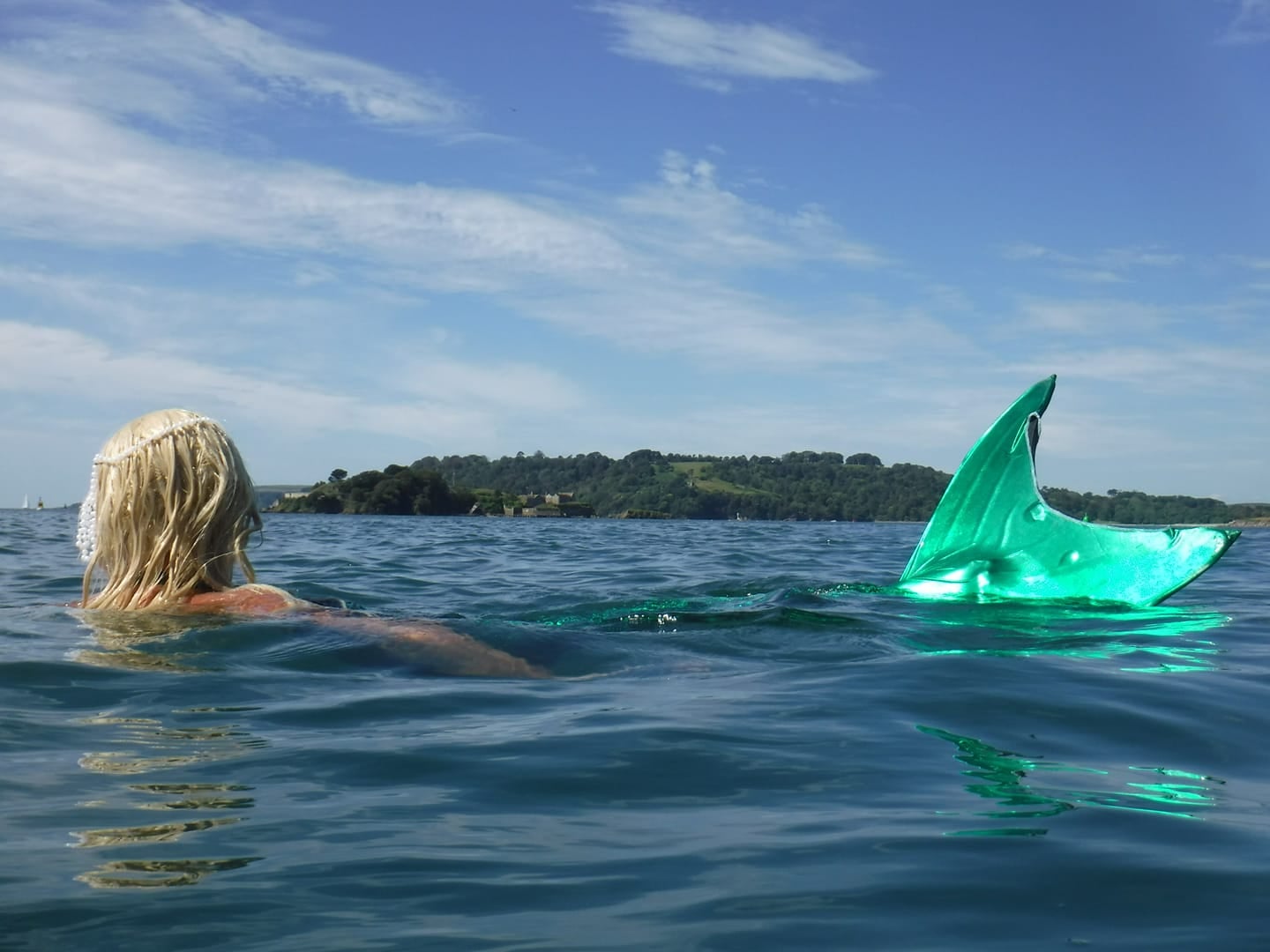
Pauline, 58, worked for Lloyd’s Bank for 40 years before she took an unexpected early retirement last year – “so now my world is full of mermaids and polar bears and penguins and swimming”.
She had always been a swimmer, competing as a teenager and performing aquatic ballet, and has now crossed the Channel “a few times”. But about seven years ago, she grew tired of the “serious stuff”. “Let’s do something a bit more fun, I thought, a bit more escapism. So I got myself a mermaid tail. I should say, I grew a mermaid tail. I thought it was a fun thing to do.”
Pauline began going out in the water in her tail and enjoyed the reaction she got from beach bathers. “It brings a smile to everyone’s faces. And because I’ve got a background in synchronised swimming, I can do all the tricks and turns and wave my tail in the air. It gets a really nice reaction from people, especially kids. They’re not sure what to make of me.”
“Now, there’s a whole industry that’s grown up around it. But when I started, it was purely for fun.”
Now, the mer-industry has grown too big for the fishbowl of Plymouth. Pauline wears her tail as far as Torquay, swimming around the boats to ask if they have any champagne for her. She also recently visited the Scilly Isles, because of the pub there called The Mermaid. “I'm quite good friends with the landlord. So we went and did some mermaiding in the sea just in front of the Mermaid pub, which was good fun.”
What does mermaiding entail? “Getting my tail on, and all my accessories – there are quite a few accessories to being a mermaid,” says Pauline. “They like to look quite glamorous, and when you get your hair wet that can look a bit unglamorous. So I have mermaid hair pieces, and obviously a nice pretty top and quite a few sequins and some pearls.”
Then, she says, “I go out and have a swim, and see if I can find some people to interact with.”
I ask her if she ever tries to sing sailors to their doom. “That’s sirens,” she corrects me. “Sirens used to be birds, and then they morphed into mermaids somewhere along the lines of the mythology.”
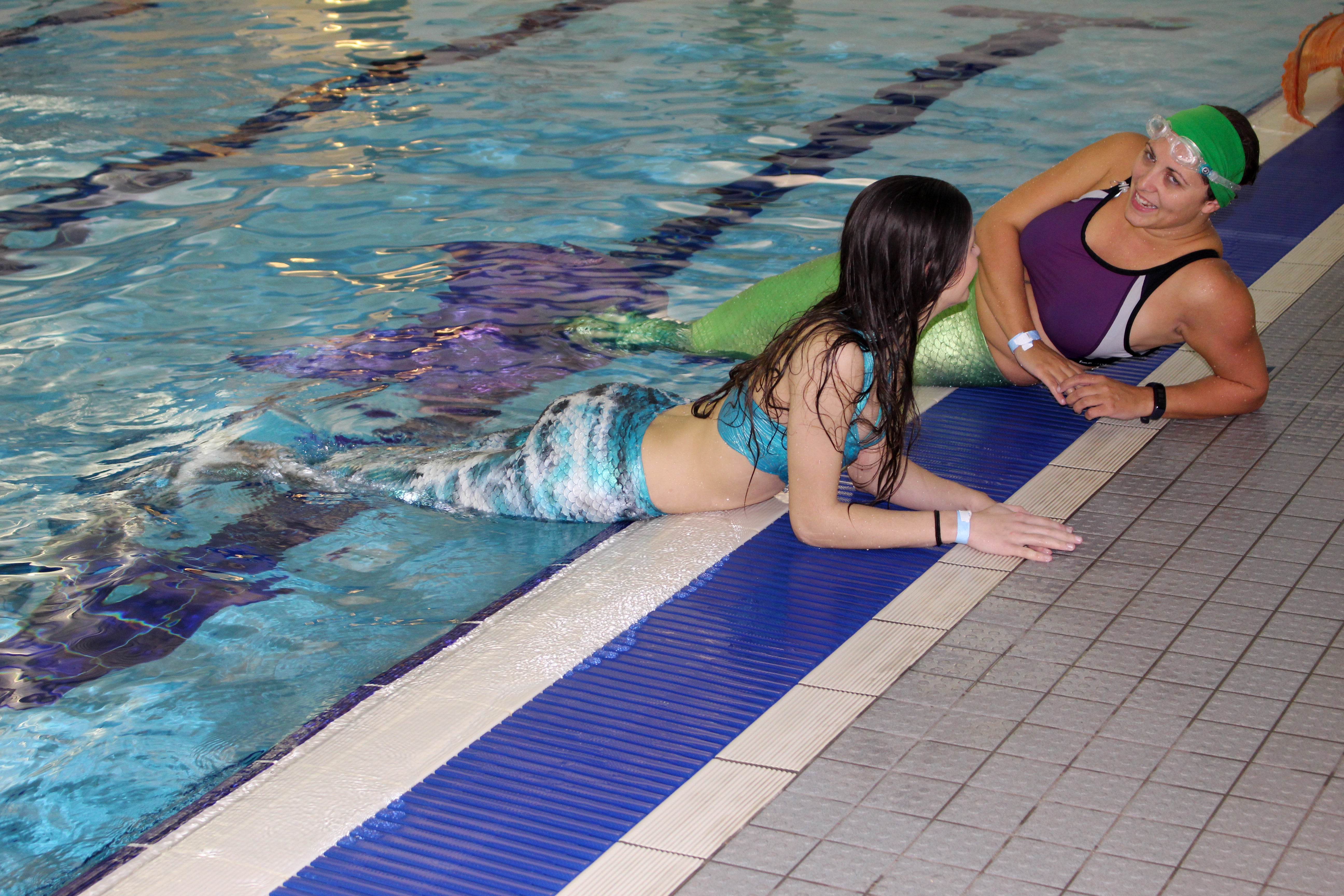
But, she says, “I’m a nice mermaid. I go around making people happy rather than luring them to their deaths on rocks.” Her mermaid name is, aptly, Ocean.
The attraction of mermaiding, she says, is in the whimsical joy of it. “I love being in the sea anyway, so I love my wild swimming and I like being out there amongst nature in all kinds of weather. I’ll swim in some very rough seas … but to dress up as a mermaid, it’s just pure escapism.”
Her enthusiasm is catching. She runs a group of swimmers, based in Plymouth, that spans the whole of Devon and Cornwall. There are 30,000 members, she says, and in Plymouth alone, the number is 3,000 and growing all the time.
There is now a group of about 30 regular merfolk in Plymouth, who are gaining attention not just for their glamorous get-up but also for their battles with local pools
Plymouth is known as Britain’s “ocean city” to some – and “home of the merpeople” to those in the know. The seaside town, with its long maritime history, golden beaches and famous art deco lido that juts out onto the Sound, is becoming a beacon of attraction for people who dress as merfolk.
“It really is a hub for wild swimming,” says Pauline. “There are great swimming spots, with easy access to Cornwall and the south coast of Devon.”
There is now a group of about 30 regular merfolk in Plymouth, who are gaining attention not just for their glamorous get-up but also for their battles with local pools. “My fins aren’t generally allowed,” explains Becky, “because of their size.” She has to get out of town to Chudley or Ivybridge to stretch her tail, or head out to swim in the ocean.
Becky has even represented her adopted city in the Miss Mermaid UK pageant competition – the first competitor from Plymouth. For anyone who wonders what a mermaid contest entails, “it’s basically like a normal pageant”, Becky says. You have your modelling round – underwater – as well as a lake-swimming competition to see who can hold their breath the longest, and then, of course, a swimsuit round. Prizes include a free tail, a one-year contract with Hire a Mermaid UK and a trip to Egypt to represent the UK in the Miss Mermaid International.
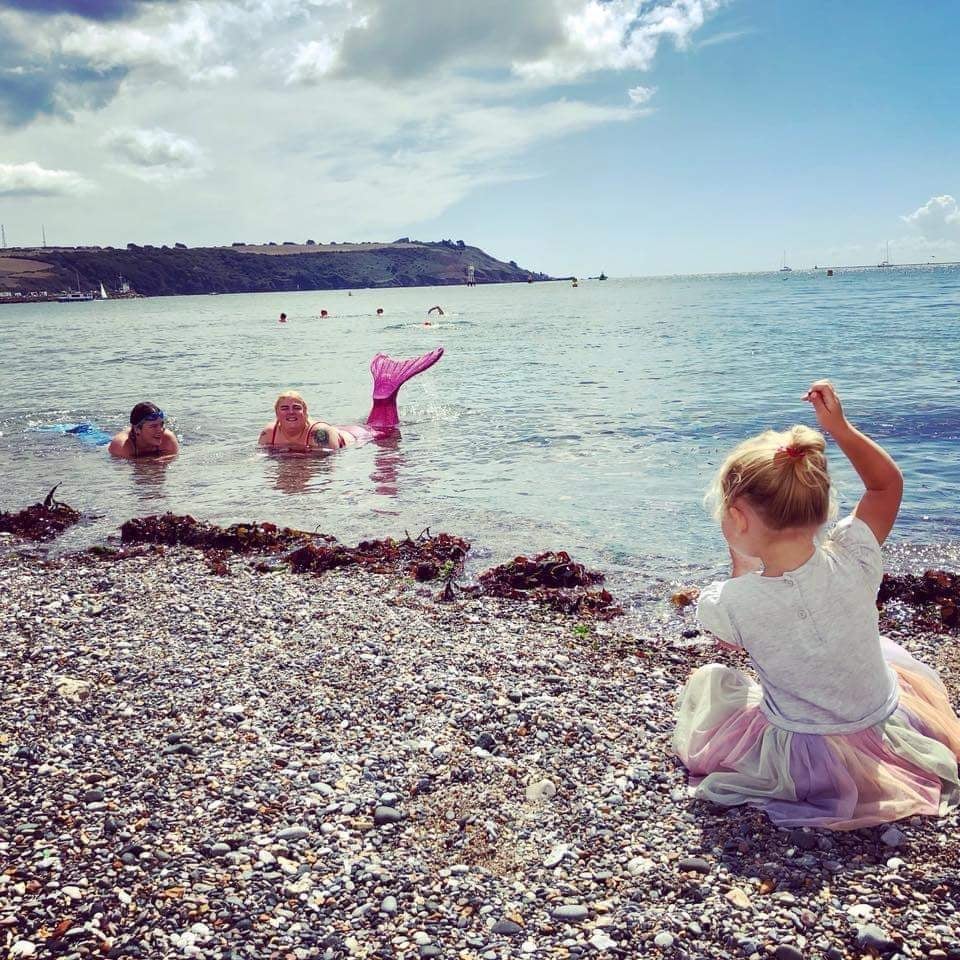
Her mermaid group would become her new family, but it was performing in a mermaid’s tail that helped Becky find her feet in her new home. In 2017, community development worker Pippa Cooper saw a mermaid in a nylon fish-scale tail, shivering by a hot tub outside Porkies Cafe. A couple of years later, Becky showed up at a meeting, full of nervous enthusiasm for her adopted neighbourhood and for environmental activism in general.
Now, people approach her in the area, asking her whether she’s the Plymouth mermaid. And Becky uses that as a conversation starter, to tell them about her community work. She has set up a circus arts group, volunteers at the food bank and regularly helps out with litter picking and art events. During the pandemic, despite struggling with her mental and physical health after another operation, she also went door-to-door with food parcels and medicine deliveries. “Whitleigh has become my home and my passion,” she says. “Being a mermaid makes me push myself. It’s helped me with my job a lot.”
What makes the group special, Becky says, is that it’s open to every type of person, from any background. Becky was also heartened to learn that there are many disabled mermaids performing in the UK. “And they’re so welcoming. This little group lifted me, helped me, and supported me.”
She has brought more newcomers into the merfolk group’s embrace, who in turn have grown in confidence and gone off to indoctrinate others. There are so many different types of people and personalities in the world of merfolk, Becky says. “We’re all individuals and we're all different shapes, different sizes, different colours, different tails.”
Becky summarises what being a mermaid means to her succinctly: “It’s fulfilling a childhood dream.” Her daughter, now six, is “completely besotted” with her mother’s work, and can’t wait to get her own tail. Becky’s two sons and partner are also extremely supportive.
More than anything, she enthuses, the merfolk community is non-judgmental. “No matter what you’ve got going on, you can guarantee one of the mermaids is going to be there saying, ‘You can do this. Come on, just keep swimming’.”
Join our commenting forum
Join thought-provoking conversations, follow other Independent readers and see their replies
Comments

Bookmark popover
Removed from bookmarks